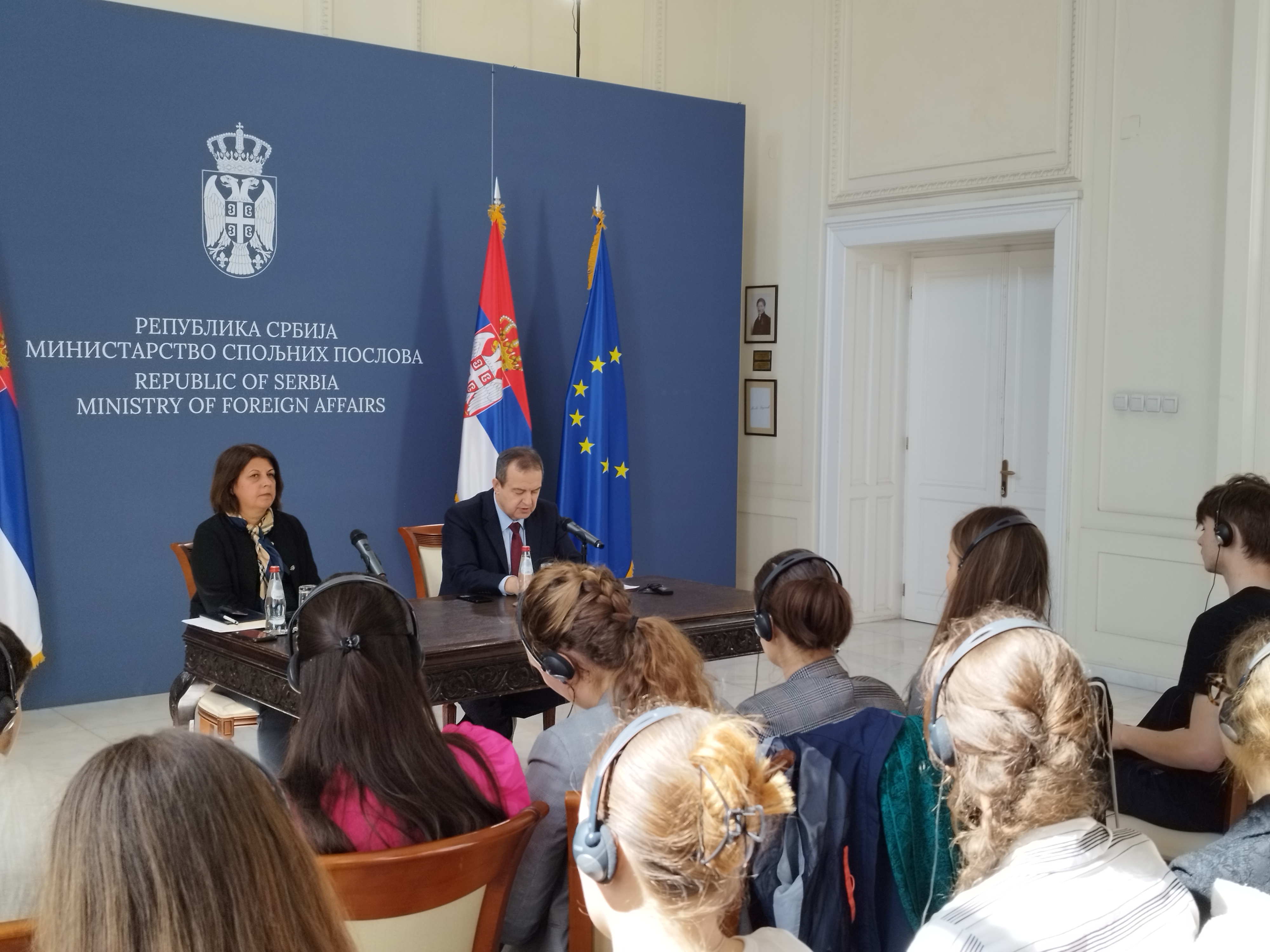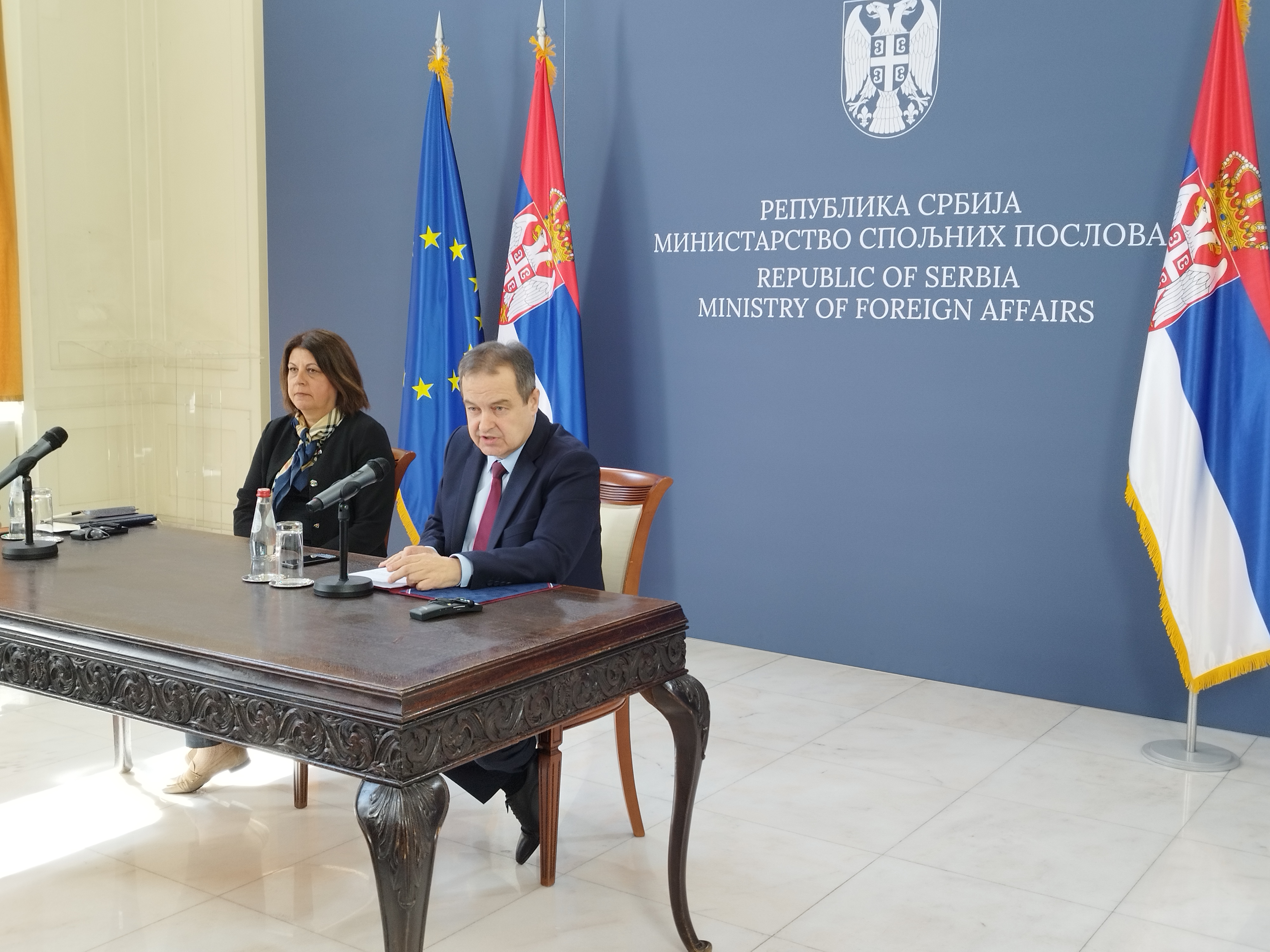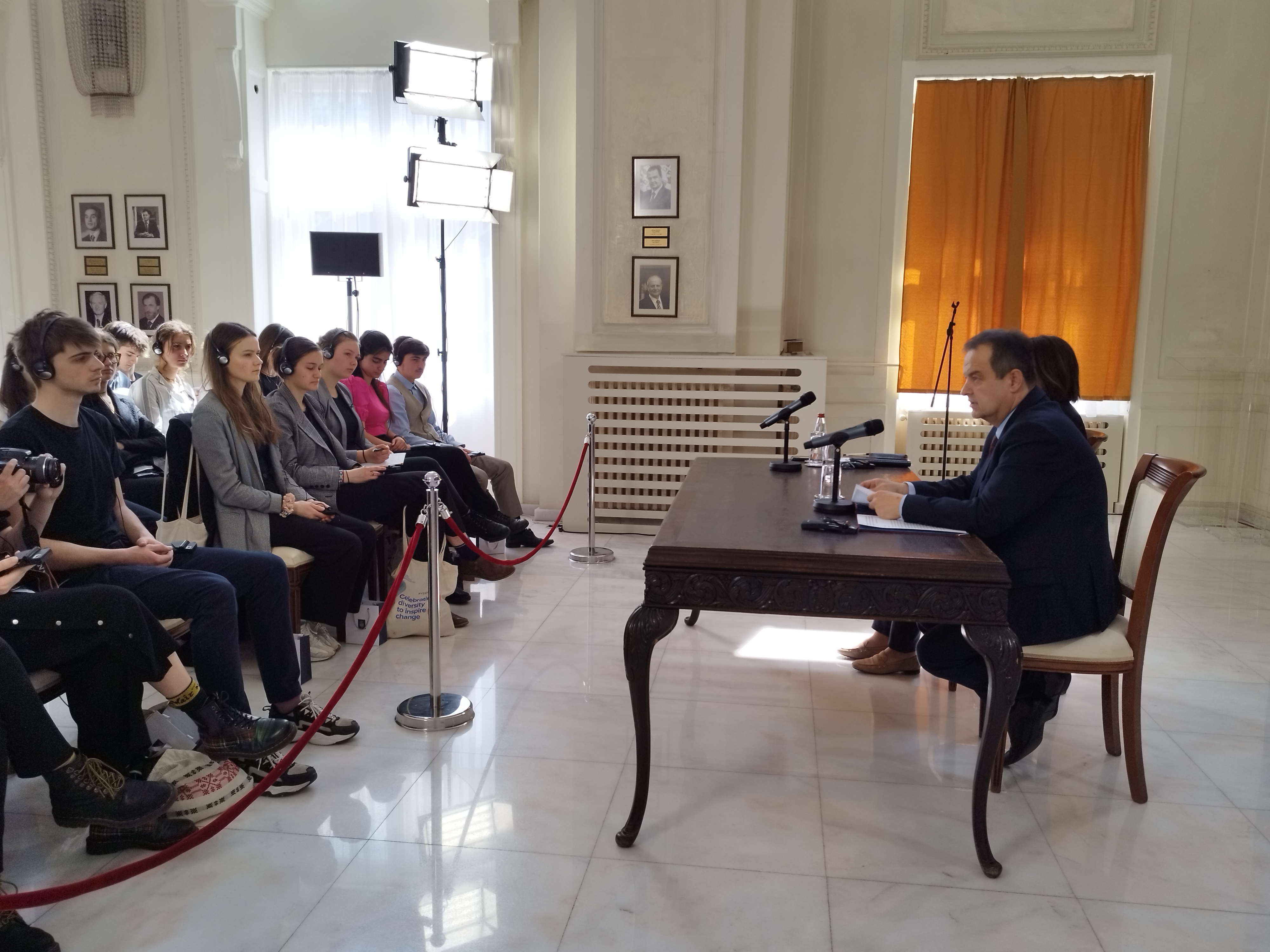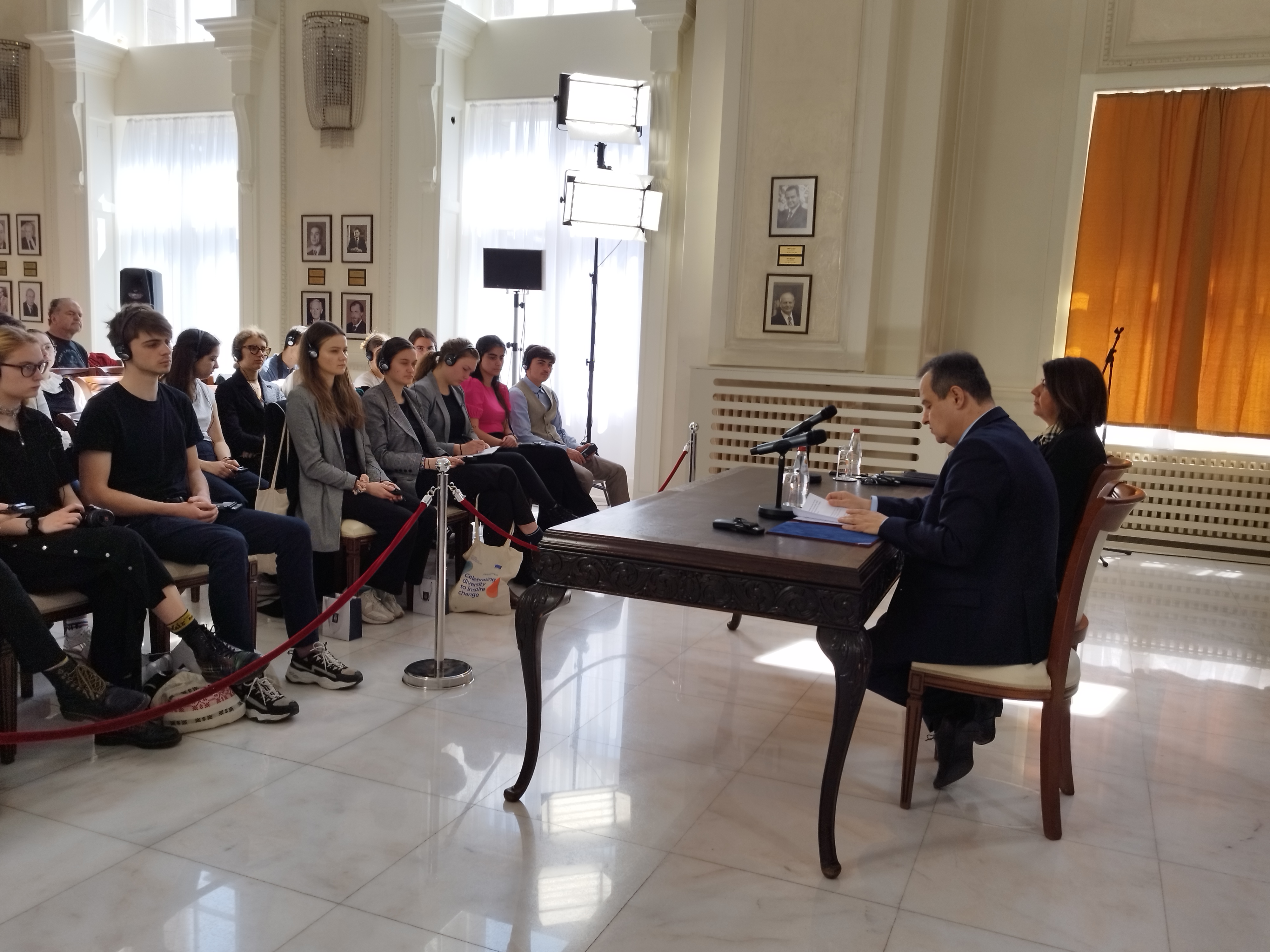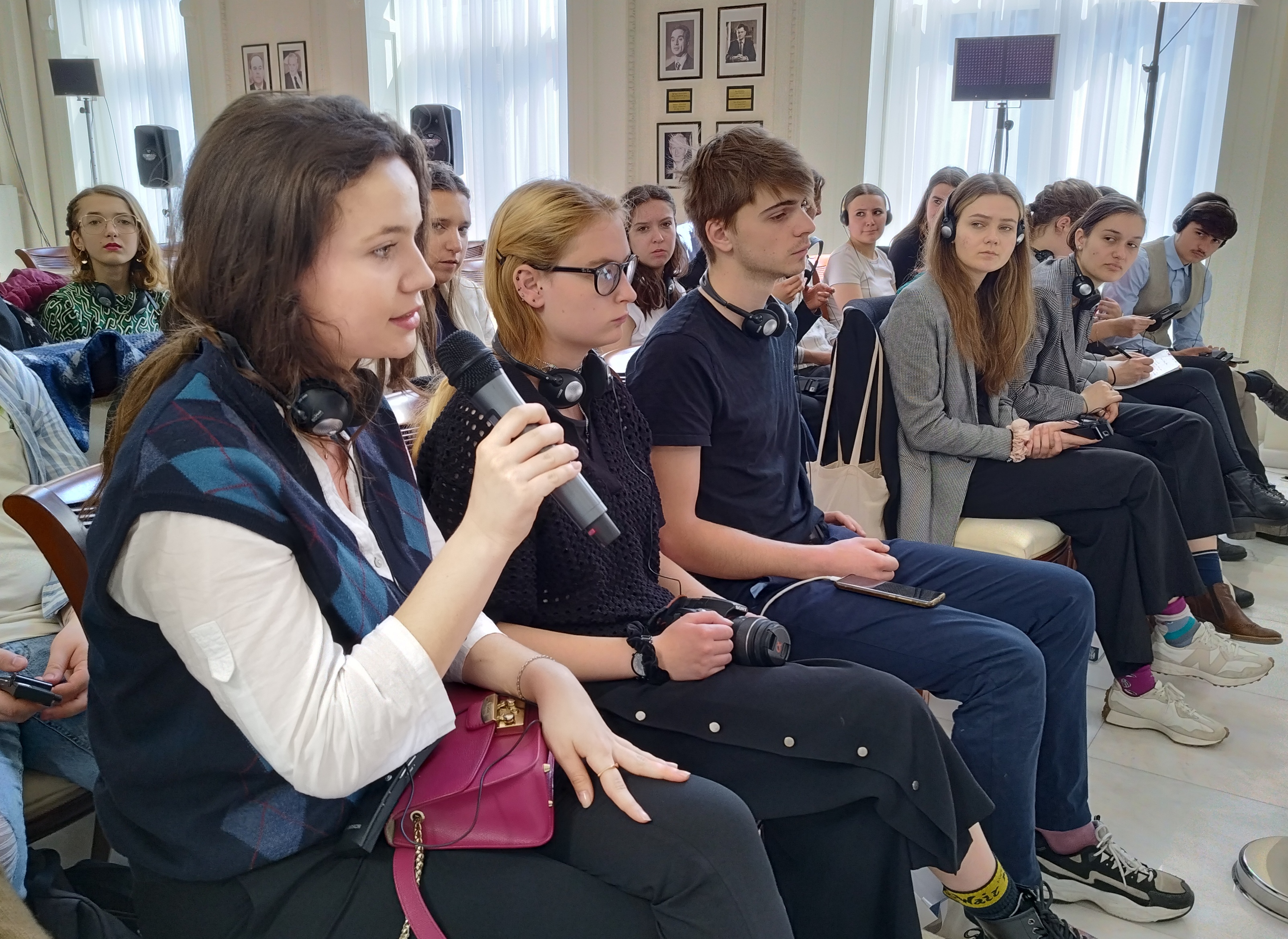Minister Dačić gives a lecture to students of the Paris Institute of Political Studies Sciences Po
Below is the integral version of the speech given by Minister Dačić.
“Future leaders,
Ladies and gentlemen,
It is a great honour to wish you welcome and to welcome your decision to visit Serbia as a part of your study journey. It is always a great pleasure to address students of Sciences Po Paris.
Since you are studying political science and international relations in such a renowned educational institution as Sciences Po, I am sure that you are on the right path. Only yesterday I was on a bilateral visit to Paris, where I met with Minister for Foreign Affairs of France Catherine Colonna, who, just like me, has a political science degree. Just as the Belgrade Faculty of Political Sciences has bred many ministers and statespeople, so has Sciences Po. Therefore I firmly believe that a new leader is among you, someone who will lead us to a brighter and better future.
In view of the fact that your research focuses on the Central, Eastern and Southeast Europe, I believe it would benefit you in many ways if I told you about Serbia’s foreign policy priorities. I hope that the speech I am giving today will contribute to a better understanding of Serbia's role and interests not only in the region, but also on a wider, global level.
Without a doubt, Serbia’s most important priority in all its actions is preservation of the sovereignty and territorial integrity of the country. As you are aware, since the start of the armed conflict in Ukraine, we have been hearing increasingly frequent appeals for a consistent observance of the United Nations Charter, particularly with respect to the territorial integrity and sovereignty of the UN Member States. Unfortunately, such appeals were not so loud at the time when the unilateral declaration of independence of the so-called Kosovo, in 2008, set a dangerous precedent. This precedent was based on an arbitrary, loose interpretation of the international law and of the right of self-determination. As students of political science, you know that hypocrisy is not a valid accusation in politics, but by opening this Pandora’s Box, the international community has almost certainly missed its chance to perhaps prevent what is happening today.
Serbia is committed to finding a sustainable compromise solution for the issue of its southern province through the Belgrade–Pristina dialogue mechanism under the auspices of the European Union. Unfortunately, in spite of certain forward movements in the dialogue, we are witnessing a trend of unilateral actions by Pristina, heightened tensions and an overall atmosphere of mistrust. Thus is the security situation in Kosovo and Metohija sensitive and requires the presence of international missions such as KFOR, UNMIK, EULEX, in accordance with the United Nations Security Council Resolution 1244. The international presence in our southern province is the only guarantee of safety of the Serbian and other non-Albanian population. The unstable security situation is also seen in the increase of ethnically motivated incidents in Kosovo and Metohija, which are also preventing a return of refugees and displaced persons. I would like to highlight the fact that the March Pogrom and the exodus of Serbs and other non-Albanians have resulted in over 200,000 people leaving their homes, and less than 2% have returned. This is the smallest percentage of returnees in any of the post-conflict areas in the world, which is truly devastating. In order to illustrate the current situation, I would like to emphasise that Prizren, the city where I was born, and which I can now only visit with a permit, used to have a population of over 20,000 Serbs, but today the number is only around 20.
In spite of everything, we are ready to, together with our European partners, continue to work on the EU proposal for the normalisation of relations with Pristina. The crucial element of that process is the establishment of the Community of Serb Municipalities, which Pristina has undertaken to do as far back as 2013, by signing the Brussels Agreement. You will understand why Serbia, after ten years of waiting for the establishment of the Community of Serb Municipalities, is finding it very hard to believe in Pristina's commitment to something that is supposed to be a common goal - peace and stability in this part of Europe.
One of Serbia’s strategic foreign policy goals is the EU membership. We stand behind these words: our region, the Western Balkans region, is the missing piece in the European political puzzle, and the peace project that the European Union was originally meant to be after World War Two cannot be completed without its full integration. The enlargement policy, as one of the main mechanisms of the European Union action in our region, needs to be revitalised, so the process could start to adequately evaluate the reform efforts. In the specific case of Serbia, this would mean opening new clusters. It is a fact that the EU is our most important economic and political partner, with which we have over 60% of our total trade, and that 3/5 of foreign investments in Serbia are from EU Member States. In addition to this, 10% of our trade is with the countries of the Western Balkans. However, increasingly loud voices within the European Union have been asking for an internal pre-composition. We believe that this kind of process would have to run parallel to the enlargement. There is no need to remind you that ten years have passed since the European Union-Western Balkans Summit in Thessaloniki and the so-called Thessaloniki promise, but even today we are unable to tell you an indicative date when we might achieve full membership. This, however, is certainly not affecting Serbia’s reform efforts and our commitment to becoming the next full member of the European Union.
A continued improvement of the good neighbour policy is another one of our priorities. Serbia is committed to promoting a future-oriented positive agenda, which puts an emphasis not on differences, but on the development of economic and other forms of mutually beneficial connections. We believe that this could contribute to creating a more favourable overall climate in the region, and thus also facilitate a resolution of the piles of inherited issues.
I would like to direct your attention to the regional initiatives, in particular the Berlin Process and Open Balkan. The Berlin Process, which originated in 2014 at the initiative of Germany, with the aim of marking the 100th anniversary of the beginning of the World War One, has grown into a serious regional form of cooperation. Simultaneously, Open Balkan, which is being jointly implemented by Serbia, Albania and North Macedonia, focuses on topics and areas of common interest – enhancement of economic cooperation, of the European integration process and infrastructure connectivity. All of this is significantly contributing to the improvement of the overall image of the region as a zone of prosperity and cooperation, and therefore also as an attractive investment destination. The aim of Open Balkan is to ensure free movement of people, goods, capital and services, which are the principles of the functioning of the European Union, with the ultimate goal to contribute to the acceleration of the integration process.
Other than a balanced and diverse cooperation with major powers such as the USA, Russian Federation and the People's Republic of China, the Republic of Serbia’s interest is to develop the best possible bilateral relations with the most developed countries in Europe: Germany, United Kingdom, Spain, France, Austria and others, as well as with countries of Asia, Africa and Latin America.
The previous period was characterized by intense political dialogue with the majority of European countries, and relations with some of them, such as Germany and France, are very intense on all levels. These two countries are among the most important of Serbia’s foreign trade partners in the entire world, and among the most significant investors, as witnessed by a continued grown of the foreign trade volume.
I am proud that I can say that Serbia and France are connected by a history of friendship and by deep and cordial bonds between our two peoples. Yesterday I was visiting Paris, where I had an exceptional meeting with Minister for Europe and Foreign Affairs of France Catherine Colonna, and we reaffirmed our excellent relations and strategic partnership established in the 2011 Strategic Partnership and Cooperation Agreement. The political dialogue is very intense and dynamic, which is particularly valuable, as meetings on the high and highest levels are what encourages the development and reinforcement of connections in all other areas too, as well as cooperation between other entities and institutions of the two countries.
I would like to emphasise that there is genuine will in the Republic of Serbia for promotion of the French language, as well as for cooperation with the International Organisation of La Francophonie. We are committed to the values of this organisation – the promotion of peace, democracy, human rights, intercultural cooperation and dialogue and solidarity, both at the global and at the regional level. Our goal is to gain the status of a full member of the International Organisation of La Francophonie in near future.
Serbia has symbolically expressed its commitment to strengthening relations with Africa by officially designating the 25th of May as the Day of Friendship with the peoples of Africa, a date which is marked each year. Serbia wishes to renew and reinforce these connections, and has been taking concrete steps to deepen its overall relations with the countries of Africa and the Middle East, and to achieve mutual understanding and cooperation, particularly in the field of economy. At the same time, we are committed to improving our relations with the key regional organisations such as the African Union, where Serbia has the observer status, and the League of Arab States. We have been carefully following the situation in the Middle East, building partner relations with all countries of that region, not taking any of the sides in the current conflicts and misunderstandings with which that region has been saddled. We have also been intensifying our bilateral relations with the countries of Latin America and East Asia.
I am very happy that we have considerably strengthened our relations with the countries belonging to the Non-Aligned Movement. In 1961, the former Yugoslavia was one of its founders. It is already a tradition in Belgrade to mark significant anniversaries of the foundation of this important movement, which helped the process of decolonisation and non-alignment of many countries. Thus we marked the 50th and 60th anniversary of the Movement’s foundation in Belgrade, in the presence of many delegations at the highest level.
I would like to point out that, even though Serbia is militarily neutral, this is not stopping us from achieving cooperation with military alliances such as NATO. On the basis of our military neutrality, and in the interest of the regional, European and global stability, we are improving our cooperation with NATO, primarily through the Partnership for Peace, as well as through our participation in numerous projects and programmes from various fields: science, civil protection, emergency situations, as well as the implementation of Resolution SC UN 1325, with the aim of strengthening gender equality.
By participating in UN and EU peace missions and operations, Serbia is sharing the responsibility with other countries and contributing to the stabilisation of global circumstances and the global peace. We are currently taking part in three multinational EU operations (two in Somalia and one in the Central African Republic), and preparing to participate in the EU operation in Mozambique and in four UN peace missions (Cyprus, Lebanon, Middle East and the CAR). I am proud that the Republic of Serbia has for a long time been the third biggest contributor to these operations in Europe and the first contributor in the Southeast Europe relative to the number of its inhabitants, with a high percentage of participation of women (12%). In addition, Serbia is the first country in the region to have aligned its national strategic documents on security and defence with the EU Global Strategy,
Global security challenges, including, as one of the biggest and currently most important ones, energy security, are an inseparable part of national security, and one of the main preconditions for a continued economic development. For that reason, Serbia is interested in diversifying its sources of supply, additional investments into energy infrastructure, as well as a faster and more efficient development of capacities based on renewable sources of supply. After the outbreak of the conflict in Ukraine, this process has become even more important, as Serbia is currently highly dependent on Russian gas. We strive to create a certain energy mix and diversify our suppliers in the future, in order to ensure a stable supply of energy products.
Dear students,
In a world which is facing serious challenges, the Republic of Serbia will always strive towards the preservation of peace, stability and economic prosperity of the Balkans as a whole, guided by legitimate national interests in achieving its foreign policy goals. We are aware of the fact that in this region, which has always been a battleground of the interests of major powers and the geopolitical developments, compromise and flexibility are necessary in order to fight numerous challenges, both regional and global ones. In that regard, we strive to overcome the negative heritage from the past and to build a common future based on the principles of mutual respect and appreciation.
Finally, I would like to tell you how important it is to be guided in life by noble, sublime and humane goals. This is the only way for you, as young, educated people, to contribute, within your own professions, to the preservation of universal values, and thus also to building a more beautiful, just and safe world.
I sincerely hope that you will carry beautiful memories from Serbia, which will make you wish to visit it again and get to know it better.”

